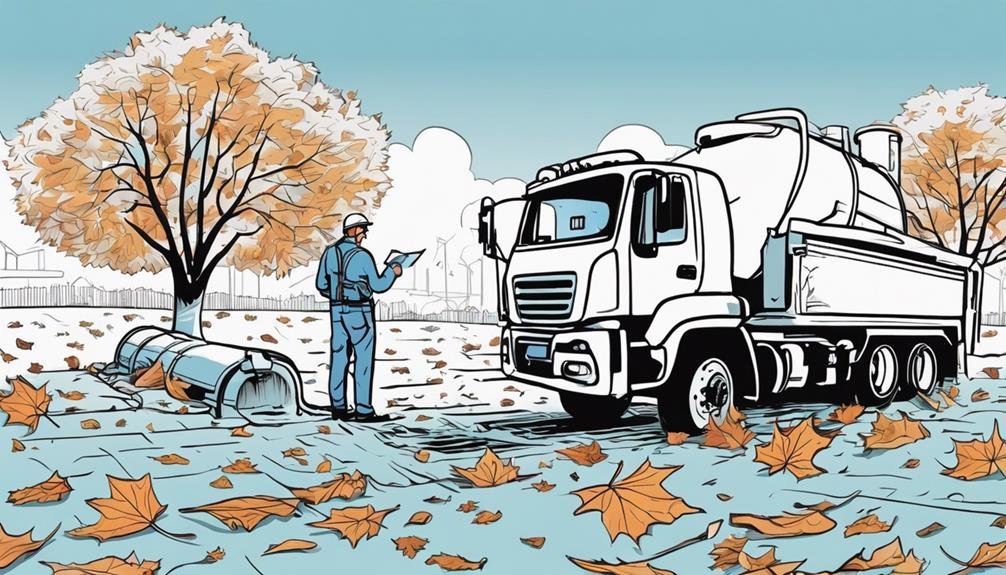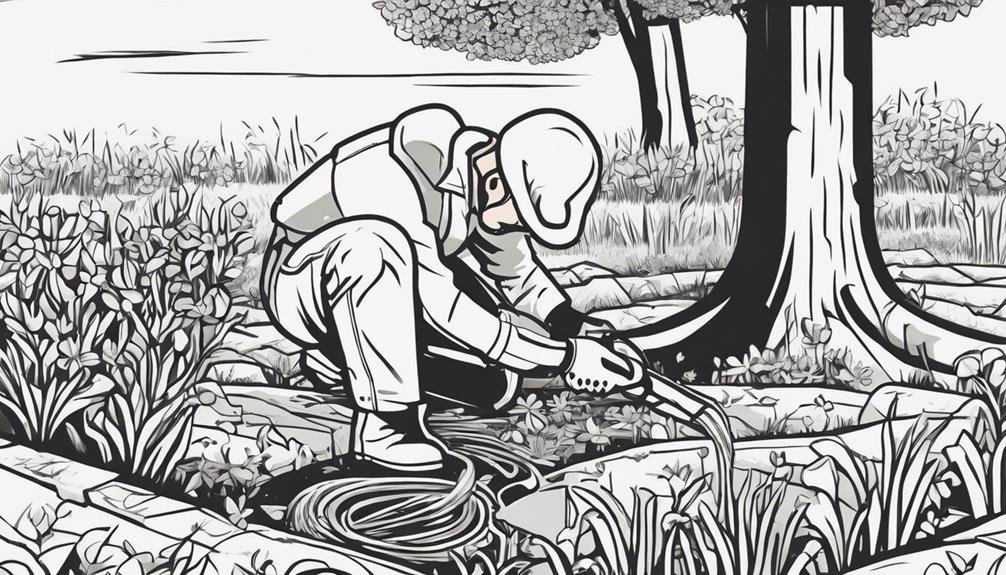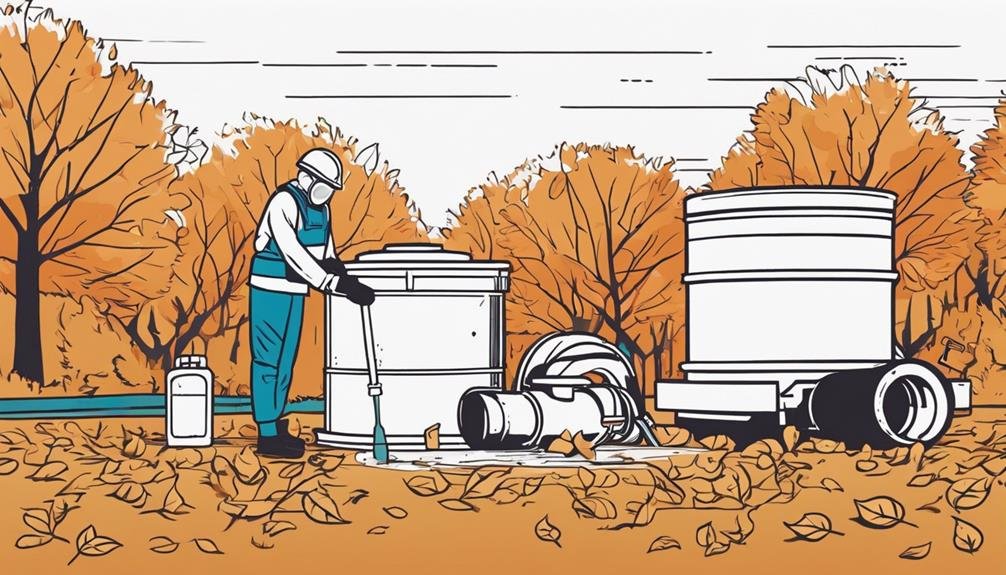In the delicate balance between convenience and responsibility, maintaining your septic tank can significantly impact the longevity of your system. From simple seasonal routines to more intricate care, there are seven key strategies that can keep your septic tank in top shape throughout the year.
Each strategy addresses different aspects of maintenance to ensure your system operates smoothly and efficiently. By implementing these practices, you can safeguard your investment and prevent costly repairs down the line.
Key Takeaways
- Conduct thorough inspections in spring and fall to detect issues early.
- Fix leaks promptly and install water-saving fixtures for conservation.
- Schedule professional drain field inspections for optimal septic system function.
- Implement preventative measures like root barriers and proper waste disposal for longevity.
Spring Inspection and Pumping

Spring is the ideal season to conduct a thorough inspection and schedule pumping for your septic tank. Regular tank inspection ensures early detection of any issues, preventing costly repairs down the line.
Start by visually inspecting the area around your septic tank for any signs of leakage, pooling water, or foul odors. Check the tank's lid and inlet/outlet pipes for any damage or wear.
Next, it's crucial to schedule pumping every 3-5 years depending on usage and tank size. Pumping removes accumulated solids from the tank, preventing clogs and maintaining proper functionality. Keep a detailed pumping schedule to ensure timely maintenance and avoid emergencies.
Summer Water Conservation Tips
To optimize your septic system's efficiency during the summer months, implementing water conservation strategies is crucial. Drought management plays a significant role in preserving your septic system. Conserving water not only benefits the environment but also helps maintain the balance of bacteria in your tank. Here are some water-saving techniques to consider:
- Fix leaks promptly: Leaky faucets or toilets can waste a significant amount of water. Addressing leaks promptly can prevent unnecessary strain on your septic system.
- Install high-efficiency fixtures: Consider installing low-flow toilets, showerheads, and faucets. These fixtures help reduce water usage without compromising performance.
- Use appliances efficiently: Run dishwashers and washing machines with full loads to maximize water efficiency. Additionally, consider upgrading to energy-efficient appliances to further conserve water.
- Limit outdoor water use: During dry spells, avoid excessive lawn watering or car washing. Collect rainwater for outdoor use when possible.
Fall Drain Field Maintenance

To maintain your drain field during fall, it is important to begin by inspecting it for any signs of damage or saturation.
Clear any vegetation or roots that could potentially obstruct the drainage process.
Lastly, remember to schedule a professional inspection to ensure your drain field is functioning optimally.
Inspect Drain Field
Consider scheduling a professional inspection of your drain field to ensure proper functioning and maintenance during the fall season. Start by inspecting soil conditions to ensure proper drainage. Check for any signs of standing water or overly saturated areas, as this could indicate potential issues with your drain field.
Next, examine the pipes in the drain field to ensure there are no blockages or leaks that could impede the proper flow of wastewater. A thorough inspection can help identify any early warning signs of problems, allowing for prompt repairs and preventing more significant issues down the line.
Clear Vegetation Around
Inspecting the vegetation surrounding your drain field is crucial for ensuring optimal performance and preventing potential issues during the fall season. Proper vegetation management plays a key role in maintaining the health of your septic system.
Here are some landscaping tips to help you clear vegetation around your drain field:
- Regularly trim grass and weeds: Keep the grass and weeds around the drain field area trimmed to prevent roots from infiltrating the system.
- Avoid planting trees or shrubs nearby: Tree roots can cause significant damage to the drain field, so it's best to avoid planting them close to the septic system.
- Maintain a clear perimeter: Ensure there's a clear space around the drain field to allow for proper airflow and sunlight exposure.
- Consider installing a root barrier: In areas where roots are a persistent problem, a root barrier can help prevent them from encroaching on the drain field.
Schedule Professional Inspection
For optimal maintenance of your septic system during the fall season, scheduling a professional inspection is essential to ensure the health and functionality of your drain field. A professional inspection in the fall allows for early detection of any issues before the winter season, enabling timely repairs and preventive measures.
During this inspection, the technician will assess the condition of your drain field, checking for any signs of damage or saturation. By addressing potential problems early on, you can avoid costly repairs and ensure that your septic system operates efficiently throughout the winter months. Additionally, this inspection serves as a follow-up to any summer septic system checks, providing a comprehensive overview of your system's current status and preparing it for winter waterproofing techniques.
Winter Insulation and Protection

You need to insulate your septic tank properly during winter to prevent freezing damage. Consider using tank heaters as an additional measure to ensure your system functions optimally in cold weather.
Proper insulation and protection are crucial to avoid costly repairs and maintain the efficiency of your septic tank during the winter months.
Insulate Tank Properly
To ensure your septic tank is adequately protected during the winter months, it's essential to properly insulate it against the harsh weather conditions. Proper insulation effectiveness is crucial in maintaining the optimal temperature inside the septic tank and preventing issues like freezing. Here are some winter protection strategies:
- Use Insulating Blankets: Covering your septic tank with insulating blankets helps retain heat and protect it from extreme cold.
- Install Tank Heaters: Tank heaters can be an effective solution to prevent freezing by maintaining the temperature inside the tank.
- Protect Pipes: Insulate the pipes connected to the septic tank to avoid freezing and blockages.
- Clear Snow Build-Up: Regularly remove snow from the tank's surface to prevent excessive cooling and potential damage.
Prevent Freezing Damage
Proper winter insulation and protection measures are crucial to prevent freezing damage and maintain the optimal functioning of your septic tank.
Frost prevention is key during winter to avoid costly repairs. Insulating the tank and pipes with materials like foam sleeves or blankets can help retain heat. Ensure that the tank lid is tightly sealed to prevent cold air from entering.
Implement winter safeguards such as covering the tank with hay or a tarp to provide additional insulation. Diverting snowmelt away from the tank and keeping the area clear of snow buildup also aid in preventing freezing.
Use Tank Heaters
Considering the effectiveness of tank heaters in safeguarding your septic system during winter is crucial for optimal insulation and protection. Energy efficient heating solutions can prevent freezing and maintain the proper temperature inside the tank. This winter maintenance task ensures the smooth flow of wastewater and prevents costly damages.
Here are some key benefits of using tank heaters:
- Prevents Freezing: Energy efficient tank heaters help in preventing freezing within the septic system.
- Maintains Optimal Temperature: By using tank heaters, you can maintain the ideal temperature for the system to function effectively.
- Reduces Risk of Damage: Tank heaters minimize the risk of damage caused by freezing temperatures.
- Improves Overall Efficiency: Ensuring the tank is adequately heated contributes to the overall efficiency of your septic system.
Early Spring Tree Root Control

When addressing early spring tree root control for your septic tank, it's crucial to implement preventive measures to avoid potential damage and blockages. Tree roots are a common culprit for septic system issues, as they can infiltrate pipes and cause costly damage. To prevent this, consider planting trees away from the septic system and using root barriers to deter root growth towards the tank. Regularly inspect the area around your septic tank for any signs of root intrusion, such as lush grass patches or slow drainage, and address them promptly.
In addition to physical barriers, you can also use chemical treatments to discourage root growth towards your septic tank. These treatments are typically applied through the toilet and can help inhibit root development without harming the tree itself. It's essential to follow the manufacturer's instructions carefully when using these products to ensure effectiveness and safety.
Late Spring Grease Trap Cleaning
To effectively maintain your septic system, late spring grease trap cleaning is a crucial task that must be completed. Neglecting this task can lead to clogs, backups, and potential damage to your drain field, especially with the upcoming summer BBQs that tend to generate more grease. Here are some key points to consider:
- Regular Maintenance: Regularly cleaning your grease trap prevents build-up and ensures proper functioning.
- Proper Grease Disposal: Dispose of grease correctly by using designated containers or recycling facilities to avoid clogging your system.
- Impact on Drain Field: Grease accumulation can harm your drain field, especially after enduring the strains of winter weather.
- Preventative Measures: Implementing preventive measures, such as installing a lint trap in your washing machine, can reduce the amount of grease entering your septic system.
Year-Round Septic Safe Practices

Implementing year-round septic safe practices is essential for maintaining the longevity and efficiency of your septic system. To ensure your septic system functions optimally throughout the year, it's crucial to pay attention to seasonal adjustments.
In winter, focus on winter septic care by insulating exposed pipes, avoiding compacting snow over the tank, and reducing water usage to prevent freezing issues. During summer, be mindful of increased water usage due to activities like watering the lawn or filling up the pool. Spread out water usage over time to prevent overwhelming the system.
Year-round maintenance should include regular inspections, pumping every 3-5 years, and being cautious about what goes down the drains. Avoid flushing non-biodegradable items, chemicals, grease, and excessive amounts of paper products. By following these year-round septic safe practices, you can extend the life of your septic system, reduce the risk of costly repairs, and enjoy worry-free functioning regardless of the season.
Frequently Asked Questions
How Often Should a Septic Tank Be Inspected and Pumped During the Winter Months?
During winter months, you should inspect and pump your septic tank every 3-5 years for optimal performance. Stick to this schedule to prevent issues like freezing or backups. Regular maintenance is key to a healthy system.
Are There Any Specific Water Conservation Tips for Septic Tank Owners During the Fall Season?
To conserve water during fall, consider adjusting sprinklers to avoid overwatering, use rain barrels to collect water for landscaping, and fix leaks promptly. Landscaping tips include planting native drought-resistant plants and mulching to retain soil moisture.
Can Tree Root Control Measures Be Implemented in the Late Fall Season?
To prevent tree root intrusion into your septic system during late fall maintenance, consider planting trees away from the tank and drain field. Regularly inspect and trim nearby tree roots. Installing root barriers can also help protect your system.
How Can Septic Tanks Be Protected From Freezing Temperatures in the Early Winter Months?
To prevent freezing in early winter, insulate your septic tank with materials like foam board or blankets. Ensure all openings are sealed to keep out cold air. Consider adding a tank heater or using straw as additional insulation.
Are There Any Specific Septic Safe Practices That Should Be Followed During the Summer Months?
During summer, maintain your septic system by avoiding excess water use, monitoring for leaks, and scheduling routine inspections. Prioritize pumping if due soon, safeguarding against costly repairs. Winter inspections ensure year-round functionality.
Conclusion
In conclusion, by following these seasonal septic tank maintenance strategies, you can ensure the proper functioning and longevity of your system.
Remember, neglecting your septic tank can lead to costly repairs and potential health hazards.
Stay proactive and implement these tips to keep your septic system running smoothly throughout the year.
Your septic tank will thank you for the care and attention it deserves.

